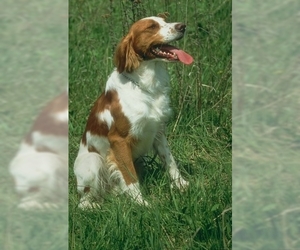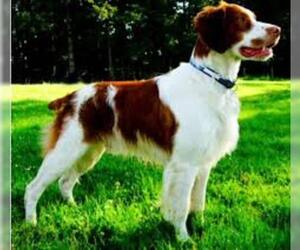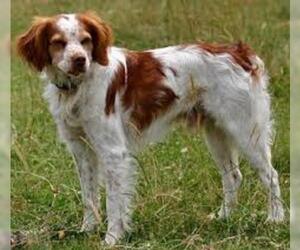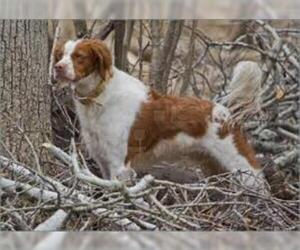
All about Brittany dog breed
A.K.A. :Epagneul Breton, Brittany Spaniel, French Brittany, American Brittany, EB, Brit, Britty, Brittany Bird Dog, Brittany Pointer, Breton Gun Dog, Brittany Flusher, Brittany Pup, Orange Roan, Liver Roan, Brittany Scout
Size
Grooming requirements
Exercise requirements
Good with other dogs
Watchdog ability
Energetic
Training requirements
Playful
Affectionate
Good with other pets
Good with children
Good with strangers
Winter
Summer
Healthiness
Protective
Life Span
| Pure Breeds | Member |
| Breeds A - Z | B |
| Breeds by Group | Gun Dog Sporting |
| Breeds by Trait | Good With Kids High Stamina Dog Breeds Smartest Dog Breeds |
| Overview: | The Brittany is a beloved and versatile gun dog, originating from the Brittany province of France in the 17th century. These medium-sized dogs are instantly recognizable by their athletic build, often appearing leggy and agile, with a dense, flat or wavy coat that comes in orange and white, or liver and white. Their intelligent and eager-to-please nature makes them incredibly trainable and responsive. Temperamentally, Brittanys are known for being friendly, energetic, and affectionate, making them excellent companions for active families. While their moderate size might suggest apartment living, their high energy levels and need for regular exercise mean they thrive best in homes with a yard or access to plenty of outdoor space. Generally a healthy breed, they can be predisposed to certain conditions like hip and elbow dysplasia, and sometimes epilepsy, so responsible breeding practices are crucial. With proper training and socialization, a Brittany will undoubtedly enrich the lives of its devoted family. |
F.A.Q.
All You Need to Know About the Brittany Breed
The Brittany is a vibrant, medium-sized gundog originating from France, known for its friendly disposition and striking appearance. These intelligent dogs are characterized by their naturally short tails, expressive eyes, and dense, often orange and white or liver and white, coat. Brittanys are renowned for their energetic temperament, making them ideal companions for active individuals or families who can provide ample exercise. While adaptable, their need for space and activity means they are not typically suited for apartment living. They thrive on training and are generally good with children and other pets, though early socialization is key. Grooming is relatively low-maintenance, requiring regular brushing to prevent matting. Common health considerations include hip dysplasia and epilepsy. If you're looking for a loyal, active, and trainable dog, the Brittany could be your perfect match!The average weight for a Brittany is between 30 and 40 pounds. Adult males typically weigh 30-40 lbs, while females are slightly smaller, generally weighing 30-40 lbs. This range represents a healthy weight for Brittany, ensuring they are agile and fit. Potential owners looking for a medium-sized, active companion will find the Brittany's size manageable and robust.
Brittany Height: Average Size & How Tall is a Brittany?
The average height of a Brittany is between 17.5 and 20.5 inches, measured at the shoulder. This gives them a compact yet athletic build.When considering how tall is a Brittany, it's important to note the typical adult height range:* Males: Generally fall within the 18.5 to 20.5-inch range.* Females: Tend to be slightly smaller, typically ranging from 17.5 to 19.5 inches.While these ranges represent the breed standard and are excellent guidelines for the Brittany height, individual genetics can lead to slight variations. Some Brittanys might be a touch under or over these ranges, but reputable breeders strive to adhere closely to the standard to maintain the breed's characteristics and health. This average size makes them a comfortable fit for many homes and activity levels.Brittany Colors: Understanding Recognized & Rare Coat TypesThe Brittany breed primarily comes in orange and white or liver and white. Both of these classic color combinations can appear in various patterns: roan, piebald, or clear white with patches. The AKC recognized Brittany colors are specifically orange and white, and liver and white. Black and white is a disqualifying fault under AKC rules, though some breeders may still produce them.While orange and white and liver and white are the standard, there are occasional rare Brittany colors and exotic Brittany variations. These include solid orange, solid liver, and tricolor (liver, orange, and white). However, these are not recognized by major kennel clubs like the AKC and may indicate mixed breeding or non-standard genetics. When looking for a Brittany, be aware that pricing and availability will differ significantly between the AKC-recognized colors and any rare coat types or unusual markings. Always verify a breeder's claims regarding Brittany coat types and ensure they adhere to breed standards if you're seeking a show or competitive dog.
The Brittany personality is known for being friendly, loyal, and highly sociable. These energetic dogs are affectionate companions who thrive on human interaction, making them excellent family pets. Their temperament of Brittany is generally eager to please, intelligent, and trainable, though they do possess a strong prey drive rooted in their hunting heritage.Brittanys are typically good with children, often enjoying playtime and being gentle, provided they are well-socialized from a young age. They usually get along well with other pets, especially if introduced properly, though their natural hunting instinct might require supervision with smaller, non-canine animals.While adaptable, Brittanys are not ideal for apartment living unless their significant exercise needs are met daily. They are high-energy dogs that require ample opportunities to run, explore, and mentally stimulate themselves. Without sufficient activity, they can become bored and destructive. Their desire to be part of the family means they dislike being left alone for long periods.
The Brittany temperament is renowned for being affectionate, intelligent, and highly adaptable, making them excellent companion dogs. They are generally very friendly and sociable with people, often forming strong bonds with their families. Their loyal nature means they thrive on human companionship and can be prone to separation anxiety if left alone for extended periods. When it comes to apartment living, Brittanys can adapt, but their high energy levels demand significant daily exercise and mental stimulation; a backyard is ideal. With children, they are typically patient and playful, making them good family pets, though supervision is always recommended. They usually get along well with other pets, especially if socialized from a young age. While generally eager to please, Brittanys can display a streak of independence, sometimes described as mild stubbornness, which requires consistent, positive reinforcement training. They are also known for being quite sensitive, responding best to gentle guidance rather than harsh corrections. Overall, a cheerful and enthusiastic breed that thrives on activity and family involvement.
Brittany Care: Daily Maintenance & Health Tips
Brittany care is generally straightforward, focusing on their active nature and overall well-being. These spirited dogs require regular attention to grooming, exercise, and diet to thrive.Grooming Needs: Brittanys have a medium-length coat that requires weekly brushing to prevent mats and reduce shedding. While not excessively high-maintenance, consistent grooming helps keep their coat healthy and shiny. Occasional baths are sufficient, especially after outdoor adventures. Ear cleaning is important to prevent infections, as their floppy ears can trap moisture and debris. Inspect and clean their ears regularly, especially if they're prone to swimming or playing in dirt.Exercise Requirements: Brittanys are high-energy dogs that need a substantial amount of daily exercise. They are not a low-energy dog breed. Aim for at least 1-2 hours of vigorous activity, such as running, hiking, or field work. Mental stimulation is equally important; interactive toys, training sessions, and puzzle feeders can help satisfy their intelligent minds. Lack of exercise can lead to behavioral issues and anxiety.Dietary Considerations: Feed a high-quality, balanced dog food appropriate for their age, size, and activity level. Consult your veterinarian for specific recommendations. Weight management is crucial for Brittanys, as excess weight can exacerbate joint problems and other health issues. Monitor their food intake and avoid overfeeding.Common Health Concerns & Preventative Care:* Skin Issues: While not as prone to wrinkles as some breeds, Brittanys can experience skin allergies or hot spots. Regular grooming and a good diet can help.* Dental Care: Daily dental care is essential. Brush their teeth several times a week to prevent plaque buildup, gum disease, and bad breath. Regular veterinary dental check-ups are also recommended.* Joint Health: Like many active breeds, Brittanys can be susceptible to hip and elbow dysplasia. Maintaining a healthy weight and providing appropriate exercise can help manage these risks.* Climate Sensitivity: Brittanys are generally adaptable, but their single coat doesn't offer extreme protection. In very cold weather, they may benefit from a coat, and in hot weather, ensure they have access to shade and water to prevent overheating.How to care for a Brittany involves a commitment to their active lifestyle, consistent grooming, and preventative health measures. With proper daily maintenance, your Brittany will be a happy and healthy companion.Brittany Activity Level: High Energy, Balanced Rest
The Brittany activity level is generally high, making them a fantastic fit for active families. These intelligent and athletic dogs possess a high energy level and require significant daily exercise needs. Expect at least 60-90 minutes of vigorous activity daily, ideally broken into multiple sessions. This can include brisk walks, jogging, hiking, playing fetch, or participating in dog sports like agility or flyball. Brittanys thrive on having a "job" to do and excel in activities that engage both their bodies and minds.Despite their energetic nature, a key characteristic of how active are Brittany is their ability to balance short bursts of intense energy with long periods of rest. After a good run or play session, they are typically happy to curl up and relax with their family. They are not dogs that constantly bounce off the walls if their exercise requirements are met.Playtime preferences often include retrieving, scent work (due to their bird dog heritage), and interactive games with their owners. They are eager to please and enjoy activities where they can engage with people.It's important to note that Brittanys are not brachycephalic; their well-proportioned muzzle allows for efficient breathing during exercise. Therefore, they do not have the same limitations due to their brachycephalic anatomy as breeds like Pugs or Bulldogs. However, like all dogs, they can overheat in extreme weather, so always exercise caution during hot and humid conditions.Given their high energy and need for engagement, Brittanys are generally not suitable for low-energy households or those looking for a sedentary companion. They need owners who are committed to providing consistent exercise and mental stimulation to prevent boredom and potential destructive behaviors.Breed Breakdown: What Experts Say About the Brittany
I would rate the Brittany's "Size" trait a 5.5.Brittanys are distinctly medium-sized dogs. They typically stand between 17.5 to 20.5 inches tall at the shoulder and weigh between 30 to 40 pounds. Their body structure is athletic and well-proportioned, lean but muscular, designed for agility and endurance rather than bulk. When compared to the vast spectrum of companion dogs, they are considerably larger than toy breeds like Chihuahuas or Pomeranians, but significantly smaller than giant breeds like Great Danes or Saint Bernards. They also fall squarely in the middle when compared to many popular medium breeds, being a bit smaller and lighter than a Golden Retriever or Labrador, but larger than a Beagle. This moderate size makes them quite adaptable. While they are energetic and require ample exercise, their physical dimensions don't necessarily preclude apartment living if their exercise needs are met. They are generally good for travel due to their manageable size and often fit comfortably in car backseats or appropriately sized airline crates. For households with space constraints, as long as they get their outdoor activity, a Brittany is a much more suitable choice than a large or giant breed, offering a good balance of presence without being overwhelming.
I would rate the Brittany's "Grooming Requirements" as a 4 out of 10.While not completely wash-and-wear, the Brittany is a relatively low-maintenance breed when it comes to grooming compared to many other companion dogs. Their medium-length, feathered double coat does shed moderately, particularly seasonally, and requires regular brushing (2-3 times a week, more during shedding) to prevent mats and remove loose hair. However, their coat isn't prone to heavy matting like some longer-haired breeds, and they generally don't require professional stripping or elaborate styling. Their ears, while feathered, are typically held open enough to allow some air circulation, reducing the risk of ear infections compared to breeds with long, drop ears, but still warrant regular checks and cleaning. Nail trimming is essential for all dogs and a Brittany's active lifestyle can help wear them down naturally, but consistent trimming or grinding is still needed. Bathing is usually only necessary when dirty, perhaps every 4-6 weeks or as needed. They are not particularly prone to extensive skin folds requiring specialized care, nor are they known for widespread severe skin allergies that necessitate constant dermatological grooming, though individual dogs can always develop issues. Overall, their grooming needs are manageable for the average owner and don't typically demand frequent, specialized, or expensive professional intervention.
I would rate the Brittany's "Exercise Requirements" a 9 out of 10.Brittanys are exceptionally high-energy dogs, bred for hunting and field work, which translates to an insatiable need for physical activity and mental stimulation. Their daily routine should include significant structured exercise, far beyond a simple walk around the block. They thrive on vigorous, sustained movement like long runs, extended hikes, and off-leash exploration in secure areas. Their energy levels are consistently high, and without adequate outlets, they can become destructive or develop behavioral issues. They excel at dog sports such as agility, flyball, and obviously, hunting and field trials, all of which require intense physical exertion and mental engagement. While they are not a brachycephalic breed, meaning they don't have the respiratory limitations of some other breeds, their endurance is remarkable and they can tolerate prolonged periods of activity. Minimal activity simply won't cut it for a Brittany; they absolutely require structured routines that challenge both their bodies and their sharp minds to remain healthy, happy, and well-adjusted companions.
I'd rate the Brittany's "Watchdog Ability" at a 4 out of 10.While Brittanys are generally alert to their surroundings and will often bark at unfamiliar sounds or people approaching the home, their inherent friendliness and desire to please significantly limit their effectiveness as a true deterrent. They are more likely to greet an unfamiliar visitor with enthusiasm (or at least curiosity) than with protective or territorial aggression. Their barking is more of an alert that "something is happening!" rather than a warning that "you better stay away!" They lack the strong territorial instincts or the willingness to actively deter intruders that you'd find in more dedicated guardian breeds. They will certainly provide early warnings through their barking, making them capable of alerting their human companions to unusual activity, but they are very much passive companions in terms of security, rather than active protectors.
I would rate the "Good with Other Dogs" trait of the Brittany breed an 8 out of 10.Brittanys are generally very sociable and friendly dogs, and this extends to their interactions with other canines. They were bred to work in close proximity to other hunting dogs and their natural inclination is often to be playful and cooperative. They typically exhibit good manners around unfamiliar dogs, often approaching with an open, tail-wagging demeanor. Their adaptable nature usually allows them to get along with dogs of various sizes and energy levels, though a high-energy Brittany will certainly enjoy a playmate who can keep up. While early socialization is beneficial for any breed, Brittanys tend to take to it well and thrive in canine company, often enjoying dog parks and group walks. They are not generally prone to aggression or strong dominance displays, and in multi-dog households, they often integrate seamlessly, forming strong bonds with their canine companions. While careful introductions are always a good practice when bringing any new dog into a home, Brittanys typically require less intensive management in this regard and readily coexist peacefully, often preferring the company of other dogs to being the sole canine.
I'd rate the "Energetic" trait of the Brittany breed a strong 9 out of 10.Brittanys are inherently high-energy dogs, built for activity and purpose. Their typical activity level is very high; they are not content to be couch potatoes and thrive on daily vigorous exercise. Their endurance is exceptional, allowing them to work or play for extended periods without tiring, a characteristic honed by their gundog heritage. They are incredibly playful, always eager for a game of fetch, a run in the fields, or any engaging activity that stimulates their minds and bodies. The need for physical stimulation is paramount for this breed; without adequate exercise, they can become restless, destructive, or develop behavioral issues. They excel in and are perfectly suited for a wide range of outdoor and athletic activities such as hunting, agility, flyball, hiking, running, and competitive obedience. Compared to other companion dogs, Brittanys are naturally active and much more outgoing than laid-back.Crucially, it's important to note that Brittanys are not a brachycephalic breed. They possess a well-proportioned muzzle, allowing for excellent airflow and efficient respiration. This anatomical feature is a significant advantage, meaning their stamina and exercise tolerance are not negatively affected by a flattened face; rather, their well-designed respiratory system contributes to their remarkable endurance and ability to sustain high levels of physical activity without the breathing difficulties experienced by brachycephalic breeds.
I'd rate the Brittany's "Training Requirements" a 7 out of 10.While highly intelligent and eager to please their owners, Brittanys are also active, high-energy dogs with a strong prey drive. This combination means they are not inherently difficult to train, but they absolutely require consistent, structured, and engaging training from an early age. Their attention span can be good when motivated, but their curiosity and desire to hunt can easily distract them, especially in new environments. They generally respond very well to positive reinforcement, thriving on praise and treats, and can learn a wide range of commands quickly. However, their stubbornness can emerge if they don't see the value in a command or if their energy isn't adequately managed. They are generally not recommended for absolute first-time dog owners unless those individuals are committed to investing significant time and effort into training and socialization. Experienced handling, or at least a willingness to work with professional trainers and implement structured routines, will yield the best results and prevent unwanted behaviors from developing.
I'd rate the "Playful" trait of the Brittany breed a strong 9 out of 10. They are exceptionally spirited and fun-loving, consistently demonstrating a high activity level and an insatiable love for games and interaction. Brittanys are renowned for their enthusiastic response to toys, their eagerness to engage in fetch or tug-of-war, and their general exuberance in daily life. They thrive on human attention and often initiate playtime, seeking out their owners for a game or a vigorous romp. Compared to many other companion dogs, Brittanys are naturally more energetic and spirited, rarely exhibiting a laid-back demeanor when there's an opportunity for fun. Their playful nature extends beyond just exercise; they often display a joyful bounce and an eagerness to explore, making every outing an adventure.
The Brittany breed rates a solid 9/10 on the "Affectionate" scale.Brittanys are renowned for their incredibly loving and people-oriented nature. They have a strong desire for human companionship and are often described as "Velcro dogs" due to their tendency to follow their owners from room to room. Physical closeness is a hallmark of their affection; they adore cuddling, enjoy lap-sitting (regardless of their size!), and will readily lean into their humans for comfort and connection. Their loyalty is unwavering, and they are highly sensitive to their owner's emotions, often offering a comforting nudge or presence when sensing distress. This breed absolutely thrives on affection and considers themselves an integral part of the family, often preferring to be in the same space as their loved ones rather than off on their own. While they are intelligent and capable, their emotional fulfillment is deeply intertwined with the love and attention they receive from their human companions.
I would rate the "Good with Other Pets" trait of the Brittany breed a 7 out of 10.Brittanys are generally very sociable and friendly dogs, often enjoying the company of other canines. Their pack-oriented nature usually translates to a good rapport with other dogs, especially when properly socialized from a young age. They are adaptable and can thrive in multi-dog households. However, their strong prey drive, inherent in a bird-hunting breed, means that their compatibility with smaller, non-canine pets like cats can be more variable. While many Brittanys can learn to coexist peacefully with cats, particularly if raised with them from puppyhood, their instinct to chase can be a challenge. This often requires consistent training, supervision, and early, positive introductions to ensure a harmonious relationship. Resource guarding is not typically a prominent trait in the breed, but as with any dog, it can emerge without proper training and management. Overall, with good socialization and mindful introductions, Brittanys are well-suited for multi-pet households, though their prey drive necessitates extra attention when it comes to smaller, non-canine companions.
The Brittany breed rates a solid 8 out of 10 for "Good with Children." They are naturally affectionate, good-natured, and remarkably patient, making them well-suited for families with children of various ages. Their playful and energetic nature means they're often up for a game of fetch or a run in the park, which is a great outlet for children's energy too. Brittanys are generally tolerant of noise and handling, although like any dog, early socialization and teaching children respectful interaction is always beneficial. While they are naturally gentle, consistent training ensures they are well-behaved family members, and their desire to please makes them responsive to guidance. Supervised interactions are always recommended, especially with very young children, but the Brittany's inherent sweetness and adaptability make them a wonderful companion for a family with kids.
I'd rate the "Good with Strangers" trait of the Brittany breed an 8 out of 10.Brittanys are generally quite friendly and outgoing dogs, naturally inclined to be curious and accepting of new people. They are not typically shy or aggressive with unfamiliar adults, often approaching with a wagging tail and a desire for attention, particularly if they've been well-socialized. While they are alert and will often bark to signal an arrival, this is usually a greeting rather than a threat, and they are not known for being overly guarded. Their adaptability in public or guest-filled environments is high, making them enjoyable companions in a variety of social settings. While a well-socialized Brittany will naturally be more comfortable, even those with less intensive training tend to be more friendly than reserved, requiring minimal effort to be at ease with strangers.
I would rate the Brittany's "Winter" tolerance at a 4.Brittanys are not built for extreme cold. While they possess a double coat, it's not particularly dense or long, especially compared to breeds specifically bred for cold weather. They are medium-sized dogs with a moderate amount of body fat, but not enough to provide significant insulation in freezing temperatures. Their mesocephalic (not brachycephalic) skull structure doesn't pose the same respiratory issues as flat-faced breeds, but it doesn't offer enhanced cold tolerance either. They are at a significant risk of hypothermia if exposed to very cold temperatures for extended periods, especially when wet. Their desire to be active can sometimes mask the early signs of cold stress.Compared to many other companion dogs, Brittanys do require special care during winter months. While they enjoy outdoor activity, their excursions in cold climates should be supervised and limited in duration, particularly when temperatures drop below freezing. They would benefit from a protective coat or sweater for walks and outdoor play, and owners should be vigilant about protecting their paws from ice, salt, and extreme cold with booties. They are definitely not a breed that can be left outside for long in winter conditions.
I would rate the Brittany's "Summer" tolerance at a 6.While not as sensitive as brachycephalic breeds, Brittanys are still an active, medium-sized breed with a double coat, making them moderately susceptible to overheating. They are generally resilient and can enjoy outdoor activities in the summer, but their high energy levels and desire to work mean owners must be vigilant. They can regulate their body temperature reasonably well, but sustained exertion in hot, humid conditions significantly increases their risk of heatstroke. Therefore, strenuous exercise should be limited to cooler parts of the day (early morning or late evening), and ample access to shade and fresh water is paramount. They require more careful management in summer months compared to short-coated breeds or those with lower activity drives, needing active monitoring for signs of overheating and often benefiting from air-conditioned indoor environments during peak heat.
I would rate the Brittany's "Healthiness" trait as an 8 out of 10.Brittanys are generally a robust and healthy breed, benefiting from a moderate build that avoids the extremes often associated with significant health problems in other breeds. They typically have a good life expectancy, often ranging from 12 to 14 years. While no breed is entirely free from genetic predispositions, Brittanys are not known for the widespread, debilitating health issues seen in some other popular breeds, such as severe brachycephalic breathing difficulties or widespread, crippling joint problems.Their most common breed-specific health concerns tend to be hip and elbow dysplasia, as well as epilepsy, but responsible breeders actively screen for these conditions, significantly reducing their prevalence. Skin conditions are not a prominent issue, and their energetic nature generally keeps them at a healthy weight when properly exercised. They are considered more on the robust side compared to high-maintenance breeds requiring constant vigilance for specific ailments. With responsible breeding practices and good preventive care, including a balanced diet, regular exercise, and routine veterinary check-ups, Brittanys tend to thrive with minimal major health complications.
I would rate the "Protective" trait of the Brittany breed as a 3 out of 10.Brittanys are generally not considered a highly protective breed. While they are alert and will often bark at unfamiliar sights or sounds, making them decent watchdogs in the sense of alerting their owners, their territorial instincts are moderate at best. Their strong loyalty to their owners is undeniable, but this translates more into a desire to be with and please their family rather than a fierce possessiveness or aggressive defense. Their reaction to strangers is typically friendly or at least curious, rather than confrontational. They are far more likely to approach a new person with a wagging tail than with a guarding stance. Therefore, they are overwhelmingly a companion dog and not suitable as a guard dog capable of offering meaningful physical protection in a household setting. Their "protection" largely comes from their vocal alerts rather than any inherent ability or desire to intervene aggressively.
I would rate the "Life Span" trait of the Brittany breed an 8.Brittanys are generally considered a long-lived breed compared to many other companion dogs. Their average life expectancy typically ranges from 12 to 15 years, and it's not uncommon to see them live even longer with proper care. They are a relatively healthy breed with fewer widespread genetic predispositions to severe, life-shortening conditions compared to some other breeds. While they can be prone to certain issues like hip and elbow dysplasia, epilepsy, and some eye conditions, these are often manageable and not always immediately life-threatening. Responsible breeding practices, including health clearances for breeding stock, and attentive owner care (nutrition, exercise, regular veterinary check-ups, and weight management) significantly contribute to their impressive longevity. They are certainly not a short-lived breed, and they generally exceed the average lifespan for medium-sized dogs.
Brittany Puppies for saleSee all puppies for sale
Brittany Dogs for adoptionSee all dogs for adoption
Brittany BreedersSee all breeders
Similar Dog Breeds for Brittany
Breed Mixes of Brittany
Quick Breed Selector 0 - not important, 1 - smallest, 10 - largest
Variants & Mistakes :Britany, Brittney, Britanny, Brittany Spaniel, Britny, Bretany, Brittiany, Britany Spaniel, Britteny, Britton, Brittanie, Britianny, Britany Spaneil, Brettony, Brittiny, Britteney, Britanny Spaniel, Britiney, Brittiany Spaniel, Brettony Spaniel, Brittaney, Brittanie Spaniel, Britiney Spaniel, Britany's, Britanny's, Britny Spaniel, Britteny Spaniel, Britianny Spaniel, Britton Spaniel, Brittaney Spaniel, Britiny, Brittiny Spaniel, Britteney Spaniel, Brittany spaniel dog, Bretany Spaniel, Brittany's, Brittany dog, Brittany spaniel breed, Britany dog, Britanny dog, Brittney Spaniel, Brittany spaniel puppy, Brittany spaniel for sale, Brittany spaniel rescue, Brittany spaniel breeders, Brittany spaniel puppies, Brittany spaniel info, Brittany spaniel pictures, Brittany spaniel health




